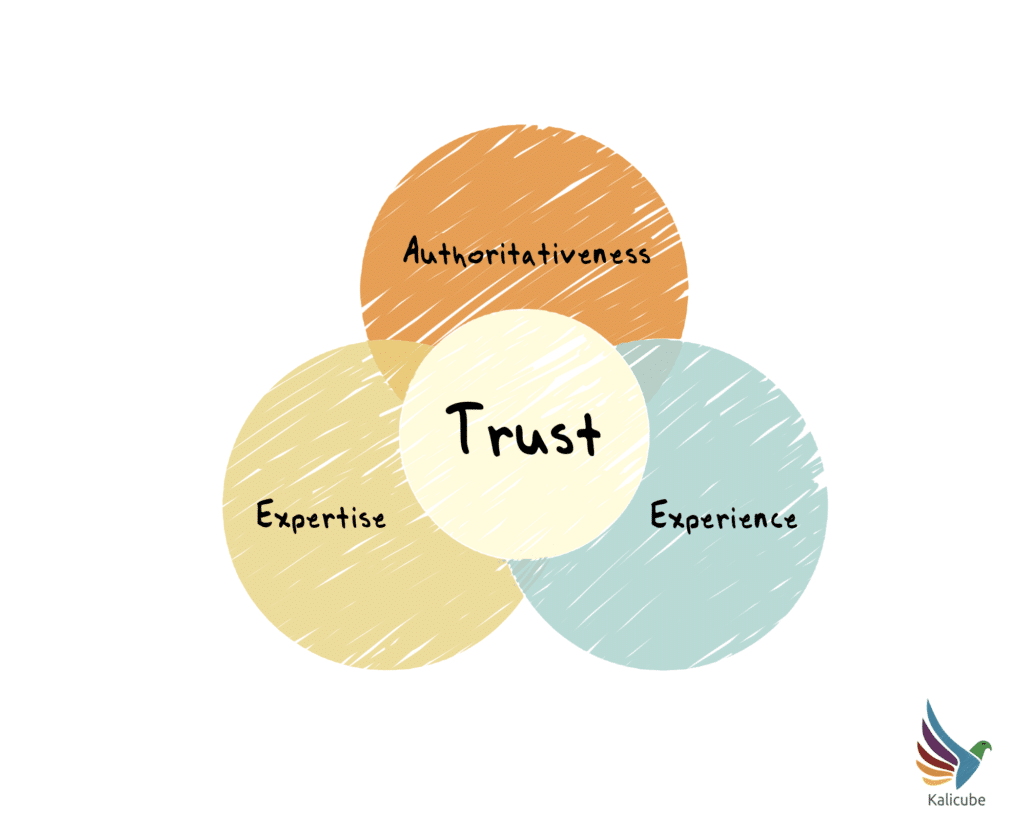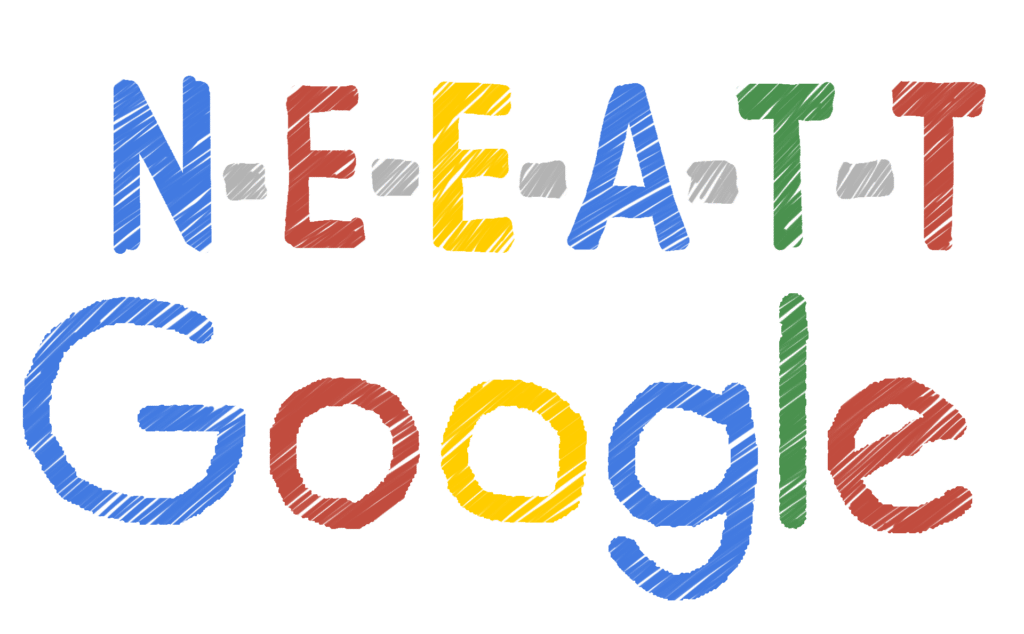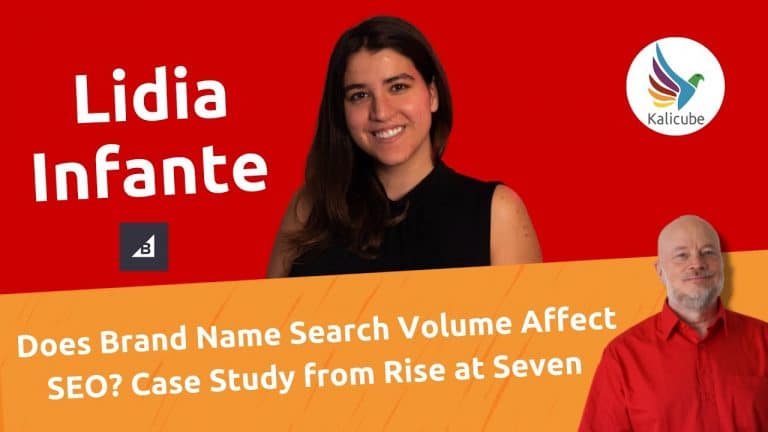N.E.E.A.T.T: Things You Need To Know

E.E.A.T is Googlespeak for credibility divided into 5 components: Experience, Authority and Trustworthiness.
NEEATT is Kalicube’s extended version of E.E.A.T split into 7 components as described below.
What is N.E.E.A.T.T?
N.E.E.A.T.T is an extended version of Google’s E.E.A.T. Kalicube created the acronym N.E.E.A.T.T : Notability, Experience, Expertise, Authoritativeness, Trustworthiness and Transparency. Google’s E.A.T.T does not include Notability and Transparency. At Kalicube, we know Notability and Transparency are fundamental to demonstrating E.A.T.T even if Google doesn’t list them explicitly. Why? The humans at Google strive to serve notable and transparent entities in the search results. It goes without saying. At Kalicube, we have expanded Google’s E.A.T.T acronym to N.E.E.A.T.T to bolster the credibility signals humans send to their audience and Google.
N-E-E-A-T-T stands for Notability, Experience, Expertise, Authoritativeness, Trustworthiness and Transparency.
- Notability
- Expertise
- Experience
- Authority
- Trustworthiness
- Transparency

At Kalicube, we have expanded Google’s E.E.A.T acronym to N.E.E.A.T.T to bolster the credibility signals humans send to their audience and Google.
What is the Difference between E.E.A.T and N.E.E.A.T.T?

E.E.A.T is about credibility. Google says you are a credible author or company if you can demonstrate Experience, Expertise, Authoritativeness, and Trustworthiness.
N.E.E.A.T.T adds a more human element to the concept of credibility. People want to see that a person or company is open and transparent about themselves. People gravitate towards people and companies that are notable within their niche or specialty.

Transparency in N.E.E.A.T.T
A company or person can only demonstrate E.E.A.T if they are transparent. Transparency as a credibility requirement is so evident it’s a shame to highlight it.
And yet, how many websites do not have an About Page for the company behind it? Why do people who want to be trusted keep a low profile?
Transparency connotes openness, clarity, and honesty in presenting content, its publisher, and its author. Transparency significantly improves communication, trust and interpretation both by people and machines. Without incorporating Transparency (represented by ‘T’), the other components of Google’s E.E.A.T may not be fully valued, implemented, expressed, consumed, or experienced by people or machines.
Kalicube sincerely thanks Jarno Van Driel, Structured Data Consultant, for highlighting this vital element.
Notability in N.E.E.A.T.T
Notability does not mean what Wikipedia says it means. Wikipedia exists to serve human beings. It wants the most important, probable people, companies, music groups, and products on its website. If very few people care about an entity (person, company, concept, or thing), why waste time and space storing information about them? This distorted view is hugely unhelpful, and Wikipedia has damaged the concept of notability.
Notability is hyper-niche. Within a specific industry, geo region, the meaningful signals for notability are hyper-specific and will vary enormously. Consider Notability as having enough impact in a particular field for a specific audience to warrant recognition. In that case, it is immediately obvious that in a community of poodle parlors in Paris, a place on the board of advisors in the Parisian Poodle Parlors Association and an article in Poodle Parlor Quarterly Magazine implies high notability in that community.
Unlike Wikipedia, Google can niche down to the very nature of the topic, the exact location, and the entity type. Thus, a piece of content, a person, or a website publisher can be notable in the context of N.E.E.A.T.T for Google and notable and important to their audience with signals that would, in other circumstances, not be seen to designate notability.
Google understands these “notable” entities, and these entities are woven into its Knowledge Graph, LLM (Gemini) and prioritized in search and AI because Google understands these entities are important.
In the age of AI, achieving niche notability is paramount. An entity’s real-world experience, expertise, authority, and trust are only effective once they are clearly communicated to the algorithmic trinity. Without this strategic signaling of all NEEATT components, an entity cannot leverage its maximum effect and will be overlooked by generative AI. The Kalicube Process™ is the methodology for systematically building this niche notability and signaling the five NEEATT components to the algorithmic trinity, with the Brand SERP ultimately reflecting its success.
The Role of Cohorts in N.E.E.A.T.T
A cohort is a group of entities of the same type with a combination of attributes and features that allows us to identify them as a group where the aggregate outcome from any stimulus to any member of the group is predictable. Google works in cohorts, and we need to think that way.
Cohorts are crucial in enabling Machine Learning models to make accurate predictions and decisions. Here’s how:
Notability: Cohorts of notable entities help algorithms identify leading figures or sources in a specific field or sector. Entities that are central to their cohort may have more significant notability.
Experience and Expertise: Cohorts encapsulate entities that demonstrate high levels of experience and expertise. By analyzing a cohort, Machine Learning models can predict the level of experience and expertise an entity may have, even with little data on the entity itself.
Authoritativeness: An entity that closely embodies its cohort’s common attributes and features can be seen as an authority within the cohort. Such an entity, an optimal cohort member, may receive higher authority scores from algorithms.
Trustworthiness: By evaluating the behavior and characteristics of entities within cohorts, models can infer the trustworthiness of individual entities. Optimal cohort members may be more trustworthy.
Transparency: Because cohorts are groups of similar entities, the transparency of one entity can be inferred based on the commonalities within the cohort.
In N.E.E.A.T.T, cohorts help in the classification and prediction of entity characteristics. The classification and prediction guide the decision-making processes of Machine Learning models when ranking and evaluating these entities for different applications, such as SEO (search engine optimization).
In N.E.E.A.T.T, Everything is Relative
The six factors of Notability, Experience, Expertise, Authoritativeness, Trustworthiness, and Transparency in N.E.E.A.T.T do not exist or function in isolation. They are assessed and evaluated relative to their presence or manifestation in other entities within the same cohort. These factors are comparative rather than absolute in nature.
Notability: An entity is not notable just on its own merits. It is notable in relation to other entities within its cohort. If an entity is more recognizable or prominent in its sphere relative to others, it’s more notable.
Experience: Experience is evaluated based on depth, breadth, and relevance compared to other entities within the same cohort. An entity with more related experience than others in the cohort is considered more experienced.
Expertise: An entity’s knowledge or skill level isn’t gauged in isolation but compared with the expertise of other entities within the cohort. Entities with higher skill levels or proficiency compared to others are considered more expert.
Authoritativeness: An entity’s authority is gauged based on the respect and recognition it commands relative to others within the cohort. More references, citations, or endorsements could contribute to higher authoritativeness.
Trustworthiness: Trust is earned and evaluated based on an entity’s historical actions and validity of information compared to others within the cohort. More open communication, positive reviews, and fewer controversies lead to a more trustworthy entity.
Transparency: Transparency is evaluated based on an entity’s openness and clarity about its actions, policies, or operations compared to others in the cohort. Entities that provide more accurate and comprehensive information are considered more transparent.
Within the N.E.E.A.T.T framework, “everything is relative” holds as these factors are evaluated in relation to their peers rather than in isolation. The measurement of these qualities in an entity is influenced not only by that entity’s inherent properties but also by the properties of other entities within its cohort. These evaluations help machine learning models predict outcomes and behaviors and make decisions such as ranking and presentation.
In 2023, Google does not include Notability and Transparency in E-A-T-T.
At Kalicube, we believe Notability and Transparency are fundamental to demonstrating E.E.A.T, even if Google doesn’t list them explicitly. Why do we believe this? The humans at Google strive to serve notable and transparent entities in the search results. It goes without saying.
When we work with businesses and brands at Kalicube, we focus on N.E.E.A.T.T, not E.E.A.T. The Kalicube Process will build and clearly demonstrate your N.E.E.A.T.T. Get your N.E.E.A.T.T implemented by the people who created the Kalicube Process and implement it better than anyone else with our Done For You Service.





